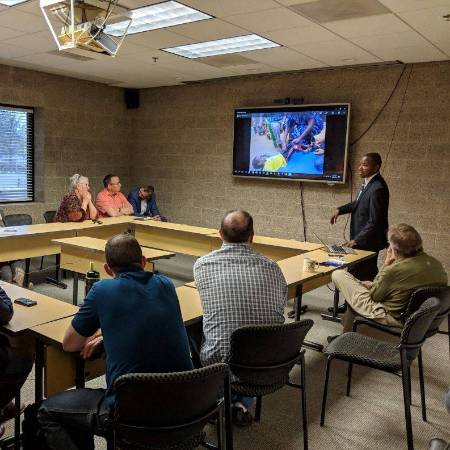State Department Fellow From Kenya Visits CPD

Lewis Murithi comes to the Center for Persons with Disabilities at Utah State University from Kenya, where he is a principal officer of the National Gender and Equality Commission. He is a US State Department Professional Fellow.
He sat down for an interview about his home country, its successes and challenges in serving people with disabilities, and what he hopes to gain from his visit to the CPD.
He started in the disability field when he trained as a physical therapist. He intends to work with the Nakuru County government in reviewing the Nakuru County Disability Act of 2016. And while there are differences in how people with disabilities live in Kenya when compared to the United States, there are also similarities.
As in the United States, people with disabilities in Kenya have a lower employment rate (33 percent in Kenya, 19 percent in the US). It should however be noted the two economies are very different; while USA employment is very formal, most of employment in Kenya is informal. “Most people have small shops or kiosks … there are few formal employment opportunities. Most people with disabilities are living in rural villages with minimal knowledge on their disability rights.”
Self-advocacy among people with disabilities is also a challenge; while people in the cities are more informed and many are organized in disabled persons organizations, people in remote rural villages are much more isolated, and with very minimal resources to even meet their basic needs. Their families are often poor. “It’s a challenge reaching some people with disabilities who live in very poor and isolated villages, especially in the northeastern, eastern, coastal and Lift Valley regions,” he said.
In addition, laws and policies governing issues of disability are not fully implemented and reviewed to suit the ever-changing disability environment and system of governance, after Kenya passed a new constitution in 2010 and created county governments. He is working with the Nakuru County Government to create a more efficient and simple-to-implement disability law which is centered on people with disabilities.
Kenya has made has had positive gains in disability intervention, which include recognition of rights of people with disabilities in the constitution and a national act affirming their rights. Kenya is one of the countries that ratified the UN Convention on the Rights of Persons With Disabilities. National law stipulates that 5 percent of jobs go to people with disabilities. People with severe disabilities receive a $20 monthly stipend from the national government, as well as tax exemptions and other benefits.
Attitudinal barriers and discrimination remain some of the biggest hurdles, Murithi said. These continue across a country which has over 40 different ethnic groups. The belief that disability is caused by witchcraft, curse and punishment for a bad deed is widespread in some communities. “Still there are cultures in the country that are not supportive of people with disabilities. There are a lot of stereotypes and negative culture to deal with.”
While here, Murithi is keen to learn disability laws and policies, adaptive technology and cultural perception on disability. He also wants to know more about the Americans with Disabilities Act and its standards. For example, he wants to learn about the ADA standards for buildings and public places, public transport and others so that he will have that frame of reference when he returns to Kenya. He is also keen to find ways in which the CPD and the Kenyan government can collaborate on disability inclusion.
Murithi’s visit to the CPD continues through May 23.
Murithi toured the smart apartment in the Sorenson Legacy Foundation Center for Clinical Excellence and the Utah Assistive Technology Program.



